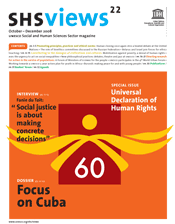| |
 |
 |
|
 |
 |
| SHSviews 22 |
| |
| UNESCO Social and Human Sciences Sector Magazine |
 |
| Human Rights: UNESCO at the forefront / Interview with Fanie du Toit: “Social justice is about making concrete decisions” / Dossier - Social and human sciences within National Commissions for UNESCO: Zoom on Cuba – October-December 2008 (English | Français | Русский) |
 |
 Duty to be vigilant Duty to be vigilant
Sixty years after the adoption of the Universal Declaration of Human Rights (UDHR), what is the climate concerning fundamental respect for all human beings, with regards to rights, conscience, freedom and responsibility? What is the situation regarding the imperious respect of human dignity and integrity, the mould from which human rights are made and implemented?
The articles and dossiers featured in this issue of SHSviews go some way to answering these fundamental questions, and are entirely relevant to the slogan for the campaign incepted by the United Nations to celebrate the 60th anniversary of the UDHR: “Dignity and Justice for All of Us”.
Today, to defend with vigour and conviction the ideals and aims included in the UDHR, is, before anything, to lead a measured and permanent fight against all prejudice, and above all, against the notion that “human dignity” would be of an ineffable nature, or at least, act as a cover for the effects of discrimination, exclusion, inequality and injustice, of which a large proportion of humanity still suffer from the consequences.
We must acknowledge that, despite considerable progress at the international level in fundamental fields such as the fight against torture, the legal condemnation of violence towards women, the recognition of the rights of refugees and migrants, nevertheless, half of humanity do not benefit from a bare minimum of just consideration of their identity and status.
Indeed, poverty, which billions of individuals appallingly suffer from, constitutes a constant denial of the respect of human rights, and clearly questions the validity, on a daily basis, of what Article 28 of the Declaration states: “Everyone is entitled to a social and international order in which the rights and freedoms set forth in this Declaration can be fully realized”.
It is for this reason that this recurring phenomenon of widespread poverty, sometimes deeply rooted in a social and cultural context, must be fought with renewed vigour and unfailing conviction. This is why UNESCO, non-governmental organizations, policy-makers and civil society must persevere in taking into consideration the fight against poverty as a central issue on their agenda.
This again is one of the greatest challenges of our time. And it is also a case of going back to the basics in the context of the dynamics of the Declaration, which is not a futile challenge.
The duty of vigilance is more relevant than ever before for the implementation of all the human rights in the Universal Declaration to be effective. Far from being declamatory, it urges us to act and make this respect for human rights a reality, which is at the same time, the respect for the difference of the Other, and for self respect.
Pierre Sané
Assistant Director-General
for Social and Human Sciences
This issue of SHSviews covers topical issues from October to November 2008:
- Human Rights: UNESCO at the forefront
To commemorate 60th anniversary of the Universal Declaration of Human Rights, UNESCO has moved to the forefront, organizing throughout the year 2008, a series of events, under the slogan of the United Nations campaign “Dignity and Justice For All of Us”. More … [PDF]
- Interview with Fanie du Toit: “Social justice is about making concrete decisions”
Winner of the UNESCO Prize for Peace Education, the Institute for Justice and Reconciliation of South Africa figures among those think-tanks which seek to shed light on political decisions in light of social and human sciences. Fanie du Toit, Executive Director of the Institute, answers the questions asked by SHSviews. More … [PDF]
- Dossier - Social and human sciences within National Commissions for UNESCO: Zoom on Cuba
SHSviews continues on its journey across the world to explore how social and human sciences are understood within National Commissions for UNESCO. After the Philippines, Canada and Malawi, this new issue makes a stopover in Cuba, with which UNESCO enjoys historical convergences. More … [PDF]
Also in SHSviews n°22 [PDF]:
|
 |
 |
 Email this page Email this page  Printable version Printable version
|
 |
|
|


